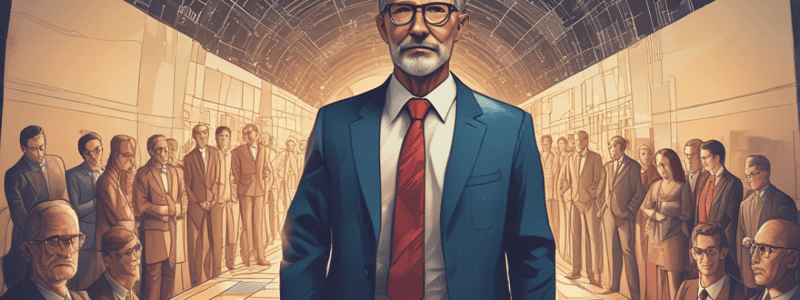Podcast
Questions and Answers
What is the primary distinction between authoritarian, democratic, and laissez-faire leadership styles?
What is the primary distinction between authoritarian, democratic, and laissez-faire leadership styles?
The degree of leader influence, with authoritarian leaders exhibiting high influence, democratic leaders exhibiting moderate influence, and laissez-faire leaders exhibiting little to no influence.
What does it mean to be an authoritarian leader, and what behaviors are characteristic of this style?
What does it mean to be an authoritarian leader, and what behaviors are characteristic of this style?
An authoritarian leader is one who exhibits high influence and is characterized by behaviors such as structuring work, laying out ground rules, closely supervising followers, and believing in rewarding and punishing followers.
How do our personal leadership styles vary, and what factors influence these variations?
How do our personal leadership styles vary, and what factors influence these variations?
Our personal leadership styles can vary depending on the circumstances, and although we tend to exhibit primarily one style over the others, they are not fixed.
What is the significance of identifying one's primary leadership style, and how can this knowledge be used to improve leadership and collaboration?
What is the significance of identifying one's primary leadership style, and how can this knowledge be used to improve leadership and collaboration?
What is the purpose of the Leadership Styles Questionnaire, and what insights can it provide about one's leadership style?
What is the purpose of the Leadership Styles Questionnaire, and what insights can it provide about one's leadership style?
What is the primary factor that influences a leader's behaviors and style?
What is the primary factor that influences a leader's behaviors and style?
What are the three most commonly observed leadership styles associated with Theory X and Theory Y?
What are the three most commonly observed leadership styles associated with Theory X and Theory Y?
How does a leader's philosophy impact their leadership style?
How does a leader's philosophy impact their leadership style?
What is leadership style defined as?
What is leadership style defined as?
What is the primary difference between an authoritarian and democratic leadership style?
What is the primary difference between an authoritarian and democratic leadership style?
What was the primary work on styles of leadership that analyzed the impact of various leadership styles on small group behavior?
What was the primary work on styles of leadership that analyzed the impact of various leadership styles on small group behavior?
What were the three leadership styles used by adult leaders in the study by Lewin and colleagues?
What were the three leadership styles used by adult leaders in the study by Lewin and colleagues?
Can a leader display only one style of leadership at a time?
Can a leader display only one style of leadership at a time?
What is similar between the authoritarian leadership style and Theory X?
What is similar between the authoritarian leadership style and Theory X?
What was the outcome of the study by Lewin and colleagues?
What was the outcome of the study by Lewin and colleagues?
Study Notes
Leadership Philosophy and Style
- A person's leadership philosophy affects their leadership style, which is driven by their beliefs about human nature and work.
- Understanding the philosophical underpinnings of one's leadership style is crucial.
Leadership Style
- Leadership style is defined as the behaviors of leaders, focusing on what leaders do and how they act.
- It includes leaders' actions toward followers in various contexts.
- Leadership style is driven by personal leadership philosophy.
Common Leadership Styles
- Authoritarian style: mirrors Theory X, characterized by a need for control and close supervision of followers.
- Democratic style: mirrors Theory Y, characterized by a more hands-off approach, allowing followers to make decisions.
- Laissez-faire style: characterized by little to no influence over followers.
Leadership Continuum
- Leadership styles occur along a continuum, from high leader influence (authoritarian) to low leader influence (laissez-faire).
- Democratic style falls in the middle, with a moderate amount of influence.
Flexibility in Leadership Style
- Personal leadership styles are not fixed and may vary depending on circumstances.
- A leader may exhibit aspects of multiple styles in different situations.
Historical Research on Leadership Styles
- Lewin, Lippitt, and White (1939) conducted a study on the impact of leadership styles on small group behavior.
- The study analyzed the effects of authoritarian, democratic, and laissez-faire leadership styles on groups of 10-year-old boys.
Authoritarian Leadership Style
- Authoritarian leaders perceive followers as needing direction and close supervision.
- This style is similar to Theory X, emphasizing the need for control and structure.
Studying That Suits You
Use AI to generate personalized quizzes and flashcards to suit your learning preferences.
Related Documents
Description
This quiz assesses your understanding of different leadership styles, including authoritarian, democratic, and laissez-faire approaches. Learn how to characterize your leadership style and its effects on collaboration.




